Juventud Rebelde 221
The United States and its return to darkness

The United States and its return to darkness
The Supreme Court’s decision to strike down a woman’s constitutional right to reproductive freedom is just one of the revisions to be made by the highest judicial authority dominated by traditionalism and backlash
Posted: Saturday 02 July 2022 | 10:40:22 pm.
Juana Carrasco Martin

juana@juventudrebelde.cu | digital@juventudrebelde.cu
Translated and edited by Walter Lippmann for CubaNews.

A divided society: this is how they demonstrated last December in front of the Supreme Court for and against abortion. Autor: AFP Publicado: 02/07/2022 | 09:38 pm
In the 1950s, in my neighborhood in Vedado, where apartment buildings and some residences for middle-class professionals were being built on barren land and on land occupied by citadels or old houses that were being demolished, a family with two high-rise apartments was the talk of the town when their purpose was “leaked” there.
The doctor who owned the building had his private practice and clinicthere for an exclusive clientele, American ladies who were spending a “vacation on the Caribbean island”, destined to have an abortion, all as discreetly as money allowed, to circumvent the laws of her country, which prohibited that medical practice and as did the laws of Cuba.
The interruption of pregnancy was only declared free and legal in Cuba in 1961. It was a clear and fair vision of the woman’s right to decide about her body and the possibility of doing it without taboos and in a safe way for life. This was put into practice from 1965 in the National Health System. It is said that pregnant women’s mortality due to illegal and unsafe abortions decreased to practically zero.
It was in 1973 that the United States succeeded, after a judicial struggle initiated in 1970, in legalizing abortion when Jane Doe, the pseudonym used by Norma Leah McCorvey, a woman from Dallas, denounced Henry Wade, district attorney of that Texas city, to demand her right to have an abortion – she had two children and her lawyers filed her petition because she had been raped – and the judges of the highest judicial authority in the United States ruled in favor of making abortion a constitutional right.
Nearly two decades later, in 1992, that decision was reaffirmed by the Supreme Court in Planned Parenthood v. Casey in a 5-4 vote. However, the most backward segments of a deeply puritanical society, often associated with religious beliefs, persecuted medical personnel, activists and women alike for the practice of women’s free reproductive rights.
Attacks on clinics, assassinations, and individual threats, were also coupled with judicial persecution. According to data from the National Advocates of Pregnant Women (NAPW), a women’s legal defense organization, since 1973 more than 1,700 women have been imprisoned or detained and prosecuted for the criminalization of pregnancy.
Of course, NAPW is concerned about what may happen from now on, when the Supreme Court overturned the Roe v. Wade ruling, and termination of pregnancy will no longer be a constitutional right, Each of the 50 states of the Union will impose the rules and limits on pregnant women, which translates into 166 million women in the United States being in their hands and unable to make decisions over their bodies and lives.
In this summer of 2022, what was believed for 49 years to be a step forward and definitive, was cut short by the 6-3 decision of the current Supreme Court. It was tailored to the stalest mold and extreme traditionalism of a good part of American society, because President Donald Trump was able to appoint three of the nine judges, tipping the balance in such a way that leaves a legacy of right-wing thinking and decision-making power that will weigh on American society for many years, since the terms of a Supreme Court justice is for life.
Now women who need or want to terminate a pregnancy will have to travel to the “liberal” states where it is allowed or to neighboring countries such as Canada and Mexico, for example, in order to make their own decision. Some commentaries emphasize how the persecution and trials could lead them to prison, even with accusations of murder or manslaughter.
A commentary in The Hill, signed by Liberty Vittert, under the headline “The biggest danger in overturning Roe: your phone could send you to prison,” warned, “You’re scared, you’re alone and you’re pregnant. You can’t keep the baby and you want an abortion. However, the state you live in had a trigger law that automatically made abortion a crime when the Supreme Court overturned Roe v. Wade last week. You decide to have an abortion anyway at a clinic that is still doing it 100 miles from your hometown.
“Now you’ve committed a crime, and the police have a new arsenal of evidence to arrest you at their disposal. Did you use Google Maps or Waze to drive to the clinic? Police can get warrants or subpoenas to get your Apple or Google cell phone location data to see where you went and how long you stayed there. Did you stop using your period-tracking app? Law enforcement can get that data. Did you Google an abortion clinic? Law enforcement can get that data.”
Although hypothetical, not fiction as related, abortion has once again been criminalized and any action linked to it is considered a crime or offense, can be investigated, prosecuted and convicted and since the Supreme Court made its ruling final, “trigger laws” banning the medical procedure have already gone into effect in several states.
Objectively, the Supreme Court’s action has divided the nation, and demonstrations for and against it came face to face in front of the Temple of Justice, a monumental marble edifice whose quarries of provenance almost identify the current ideological makeup of the nine justices: those stones came from Vermont, liberal and politically independent-minded; from Georgia, the state that was the icon of segregation; from Alabama, which continues to recall the black belt of slavery in its cotton fields; from Spain, where Franco’s phalanx drowned a people; and from the fascist Italy of Benito Mussolini, to whom the architect builder thanked for his marble contribution.
A first step on a path of retrogression
This overturning of Roe v. Wade is only the first back-to-the-darkness ruling by the U.S. Supreme Court in a series that will undoubtedly transform the country. The warnings about this retrograde process have been coming ever since Trump began appointing conservative justices and upsetting the balance.
Already, New York Democratic Rep. Carolyn Maloney, chair of the House Oversight and Reform Committee has scheduled a July 13 hearing on the impact of the reversal of Roe v. Wade, which she called having “devastating effects” for generations. She sees it as the culmination of a years-long public campaign by Republicans to appoint a Supreme Court that would uphold draconian restrictions on people’s reproductive health care.
Naomi Klein, a leading scholar and environmentalist, asserted in an article in The Intercept that the United States is in the midst of a “shock-and-awe judicial coup,” a military term for a surprise and frightening attack that allows for quick victory over an adversary that has been terrorized by the power of force, in this case by the force of power. We cannot ignore the fact that a Supreme Court decision is not subject to appeal.
To the blow to abortion rights, Klein added the blow to gun control laws and the authority of the federal government’s Environmental Protection Agency to regulate greenhouse gas emissions from the use of fossil fuels, to the benefit of exploitative corporations, even to the detriment of the sovereignty of indigenous nations in the U.S.
It is not new and her warning that can be read in her major study The Shock Doctrine: The Rise of Disaster Capitalism [In its Cuban edition: “La Doctrina del Shock: El auge del capitalismo del desastre”, published in Cuba by Editorial de Ciencias Sociales, 2016.] On the Supreme Court’s docket there are other issues of impact, even affecting democracy itself, the right to vote, the redrawing of electoral districts and these judges do not seem to be precisely neutral….
It is clear that American democracy is deteriorating and on the part of the Supreme Court, the process is underway. There will still be much to tell and to analyze.
A weekend amid shootings and price hikes

A weekend amid shootings and price hikes
Things are not going well in the U.S. for the citizens who will vote in November. Pocketbooks are being ripped out, while schools, hospitals, religious institutions and even funerals are being targeted by shooters.
Author:

Juana Carrasco Martín | juana@juventudrebelde.cu
Translated and edited by Walter Lippmann for CubaNews.

Gasoline in Los Angeles. Author: Taken from Antiwar.com Published: 04/06/2022 | 09:11 pm
In Los Angeles, the host city in a few days of the Summit without the Americas, as many have labeled it because of the selective exclusion decreed by President Joseph Biden to three sovereign nations in the region, the price of fuel at a downtown gas station reached more than eight dollars a gallon and prices continued to rise throughout the United States.
Meanwhile, the price of a barrel of crude oil in the European market closed at $117.60, its highest price since March 23, and much had to do with the sanctions imposed on Russian exports due to Washington and NATO’s confrontation with the Kremlin and the war situation in Ukraine.
Crude oil costs account for just over half of the pump price, according to the U.S. Energy Information Administration. The rest of the price includes the other components of gasoline, production costs, distribution costs, overhead costs for everyone involved in production, distribution and sales, taxes and California carbon offset fees paid by refineries, City News Service said in releasing the increase that hits Americans’ pocketbooks hard.
The national average price of gasoline rose to a record high of $4.62 dollars, and it is no secret that this increase directly affects the cost of food, and a wide range of goods and services, so it has not been the only product that continues to rise.
The New York Times warned at the beginning of May that “the era of abundant cheap products could be coming to an end”, and went back to the pandemic in search of the causes. This is because, since then, the supply of goods has been severely limited and, consequently, prices have risen, with the aggravating factor that economists warn that this situation could persist, when the COVID-19 and the war in Ukraine affect international trade and inventories are difficult to fill.
Hence, inflation is affecting the global economy, practically without exception, including that of the United States which, moreover, many of whose corporations, in search of higher profits, have taken their industries to foreign territories and now ordinary Americans are paying double the consequences.
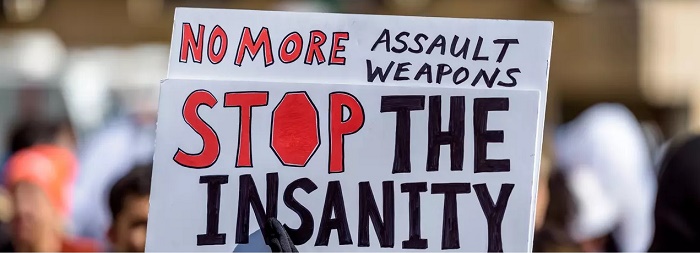
March for life against guns.Photo: Getty Images.
This rise in the cost of living is one edge of the Sword of Damocles hanging over the Democrats in the upcoming November elections, though not the only looming threat to that party. Mass shootings must be taken into account. These are much more than a problem of politicians-not public servants since they constitute an ultimatum to American society about its degradation as a nation.
The United States debates, once again and apparently with the same disappointing conclusion, how to reverse the violence that is expressed in the shootings that are leaving a trail of unfortunate deaths and, in just a week, the shootings have skyrocketed.
As of this Saturday, June 4 and so far in 2022, there have been 234 mass shootings in the United States, defined as when four or more people, not including the shooter, are injured or killed. Not a single week has gone by in 2022 without at least four mass shootings, according to Gun Violence Archive records, and at the end of May, they counted 256 people killed and 1010 injured. June began with the same criminal figures.
Saturday, June 4: Centerville, a Texas community is shaken after five members of a Houston-area family were found murdered in the Collins family cabin, a crime described as “unspeakable” that took the lives of three brothers, Carson, 16, Hudson, 11, and Waylon Collins, 18; their cousin Bryson, 11; and their grandfather Mark Collins, 66.
The killer, Gonzalo Lopez, a member of a Mafia group sentenced to two life sentences for murder in Hidalgo County and attempted capital murder in Webb County, had escaped from prison three weeks earlier. I was unable to find out what weapon was used in the crime.
More of a shock seems to be the emotional status of the U.S. citizenry. On Thursday, June 2, two separate shootings occurred in the Midwest. One in the parking lot of Cornerstone Church in Story County, Iowa, where Jonathan Lee Whitlatch, 33, shot two women in the congregation, Eden Mariah Montang, 22, and Vivian Renee Flores, 21, while a program was in progress inside the church. He then killed himself.
The other occurred in Racine, Wisconsin. Two women were shot at Graceland Cemetery Thursday afternoon during a funeral for a man who was killed by police last month. Residents heard between 20 and 30 gunshots before 2:30 p.m. as loved ones gathered to remember Da’Shontay L. King Sr. a 37-year-old Black man who was shot and killed by police after a foot chase following an attempted traffic stop on May 20, according to the Racine Journal Times. The identity of the attacker, apparently still on the run, was not released.
Gunshots and wails are still heard from the Buffalo supermarket massacres, from Robb’s Elementary School in Uvalde, and from fallen medical personnel at a Tulsa hospital. As America shudders, politicians are shaking in their boots to stand up to gun producers and their blackmailing arm, the National Rifle Association-NRA, or jingle in their pockets.
The President of the United States is waiting for Congress to decide on a proposal that barely promotes raising the age to 21 to legally purchase a gun. Hardly a band-aid for the deadly wounds caused by daily shootings, and possibly not even that will be granted by those who take refuge in the Second Amendment of the Constitution.
Shame on Biden’s words in a speech calling for the (unlikely) passage of the scrawny, rickety, flimsy reform: “I respect the culture, tradition and concerns of lawful gun owners,” and as if to cleanse himself, he added: “At the same time, the Second Amendment, like all other rights, is not absolute.”
It is very difficult to be with God and the Devil… and the voters, 97 percent of whom are in favor of some kind of limit or control on gun violence in their streets, schools, workplaces and homes, are pushing back.
What are you faithful to?

What are you faithful to?
The mysterious and not-so-mysterious motivations behind infidelities are revealed by psychologist Esther Perel, after years of studying intimacy among couples.
Author:

Mileyda Menéndez Dávila | sentido@juventudrebelde.cu
Published: Friday 07 April 2017 | 09:46:07 pm. Updated: Friday 22 September 2017 | 12:38:34 am.
Translated and edited by Walter Lippmann for CubaNews.
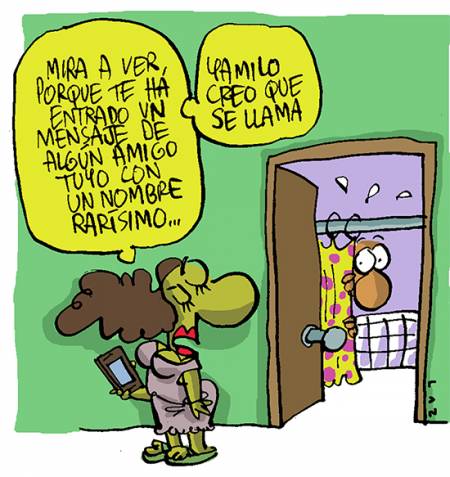
Infidelity Author: LAZ Published: 09/21/2017 | 06:53 pm
The bonds of wedlock are so heavy that it takes two to carry them, sometimes three.
—Alexandre Dumas, père
Being unfaithful has a tenacity that every marriage would envy. Its charm lies in the forbidden, but also in the intoxication of capturing a new passion, just as when the betrayed relationship began.
This is revealed by Esther Perel, a Belgian psychologist specializing in couples’ intimacy, who is visiting Cuba these days and agreed to give a series of talks on the future of femininity, an initiative of the Abanico project and its producer, Rafael Lavín.
Monogamy is concretized on a daily basis, but reality is a small portion of the human mind, where fantasy has much more space. That is why those who cheat almost never have the intention of hurting, says the expert.
More than distancing oneself from one’s partner or seeking pleasure from others, what is longed for is one’s own essence, what was left behind when assuming an exclusivity based on love, although desire is what drives these types of choices.
When it comes to light, what hurts most is not the contact with other bodies, the time or the resources “diverted” from the common desire, but the betrayal of that idealized mission to build the unique, indispensable and irreplaceable love that led them to unite in the first place.
But therapeutic practice confirms that after having an affair, many people reinforce their interest in their stable bond, improve their erotic commitment, and are ready to make up for it in a thousand ways.
Facebook that does not see…
In this digital era, it is easier and at the same time more difficult to hide infidelities. On social networks, you can meet many people, but there is also more risk of being caught in the crossfire.
Today a woman who decides to forgive is not looked at with the same condescension because there are more facilities to not depend economically on anyone and she can have all the sex she wants, says the expert. If it were not for this social pressure (always exerted on men), many people would recognize that their love is even stronger than disenchantment and would give their story another chance.
Esther is neither for nor against infidelity. Each case is a lesson and it takes courage both to break up and to rewrite the plot.
She shares two keys to achieve this: the first is that the unfaithful partner sincerely regrets the damage done to his or her partner, even if he or she does not feel remorse for the experience, and the second is to approach the conciliatory dialogue not from the sordid details (who, where, how), but from what they have learned about their own bond: Why you? Why us? What did you feel when you saw me every day? What did you discover about yourself? How do we get out of this together?
Passion vs. contract
Marriage has been, and still is in some ways, an estate agreement: which family to nurture and who gets the assets in the event of death or breakup. That is why the magnitude of the deception depends both on what is done and how it is received by the other party.
If infidelity were generated because something is missing within a relationship, all marriages would be condemned to suffer it, because no one always has everything for the other: the couple is built between two imperfect beings who dream of something dialectically superior and live in permanent challenge, negotiating power and seduction inward and outward.
The unfaithful person violates the collective faith in a romantic model that we still defend, and that violation does not begin when he gets into another bed but before, from the chatting, the compliment in the street, the gesture of attention towards other people….
It is said that men are unfaithful for fear of commitment and women for hunger of intimacy, but life is a more complex equation, especially now, that we do not marry to have sex with someone, but to stop having sex with other people, Esther points out.
Even in open couples there are clear rules about when, where or with whom you can’t experiment, but going beyond the contract is exciting: transgressing the limits gives a sense of autonomy and can become addictive, no matter how traditional or modern the couple is.
Sexual alchemy is important in this experience. After a certain time, a few minutes of fantasy sex generates more endorphins than the daily exchange with your partner. In surveys carried out in different countries, the
Esther Perel: Happiness is in the balance


Happiness is in the balance
The human couple is like a microcosm where cultural ideas penetrate and then pass to the children. A kind of portal in space and time that, like everything that responds to society, usually changes its model as the times change.
Author:

Mileyda Menéndez Dávila |sentido@juventudrebelde.cu
Published: Friday 13 April 2012 | 08:52:24 pm. Updated: Thursday 21 September 2017 | 09:34:28 pm.
Translated and edited by Walter Lippmann for CubaNews.

Desire is fire, and to grow it needs space. Author: internet Posted: 09/21/2017 | 05:19 pm
“Sexuality is a window to enter society,” says Belgian psychologist and anthropologist Esther Perel, with whom we spoke last January during the Sexology 2012 congress.
This New York-based therapist defines the human couple as a microcosm where cultural ideas penetrate and then are passed on to the children. A sort of portal in space and time that, like everything that responds to society, tends to change its model as the times change.
In her opinion, modern marriage left behind the old sexuality of reproduction and obligation to open the way to a new sexuality centered on erotic desire and governed by principles forged with Romanticism, that cultural movement that transformed the world from the 17th century onwards.
However, that romantic notion of the “passionate marriage” that is so much pursued today carries in its essence a historical contradiction: passion and commitment is a dialectical pair that we try to reconcile in order to satisfy in one person very different needs, such as adventure and stability, surprise and comfort.
“Today we women ask for more… and we divorce more because we get disillusioned very quickly. Although we still see a partner as a partner to raise a family and achieve economic security, in this century we are looking above all for our man to be our friend, our lover, our confidant.”
Modern women lead a life more open to individual projects, to social protagonism, to the decision to have fewer descendants and to fulfill themselves outside the home, but this takes a heavy toll on their intimacy, she says.
“It is an existential dilemma that all couples who manage to be stable go through: eroticism is our way of feeling alive, but without realizing it, we redirect it towards those who follow in our footsteps in the family and we neglect our erotic world,” she says.
“Many women stop grooming themselves to look beautiful, but they get satisfaction from watching their daughters do it. Others stop ‘taking care’ of their husbands to be jealous of their teenage son, and most adult married couples barely organize outings a couple of times a year, yet financially and materially support the weekly recreation of their young offspring.”
Sexually “savvy”
Esther has traveled to dozens of countries studying couples in their own historical and cultural context to try to answer those questions that everyone has ever asked: “Why is the forbidden so erotic, and after it is obtained it no longer excites us? Why is everyday sexuality, done with love, usually not as passionate as a casual encounter? Why does sex make children, and then children kill sex?”.
In fluent Spanish and full of metaphors, Esther talked to several Cuban journalists about the success of her book Erotic Intelligence, published since 2007 by several publishing houses, in which she tries to discuss these questions. [In English, the book is called Mating in Captivity]
According to what she told us, the term came up as a joke from her husband (she has been married for 30 years), but then they both made sense of it: if we are already talking about emotional intelligence, why not accept that sex demands its own share of knowledge and intuition?
In this day and age, a sexually “intelligent” woman with a secure attachment style looks for men who want her, not need her.
The difference is easy to detect, Esther assures: “In the first case they say “I love you”, while in the second case they ask “Why don’t you love me?”, even when you have given all the proof of love they have asked for throughout the relationship… And this is also true the other way around: emotionally dependent women who demand too much from their partners.
The diversity of manifestations of this dependence is above all cultural: in women, open complaint predominates; in men, it is more hidden or it emerges with a lot of aggression, especially in countries with a macho tradition.
Desire is fire, and to grow it needs space. Things will go better in many marriages when they understand that this is not a conflict to be resolved, but a paradox to be managed, like so many in this century: “You can be happy in a stable marriage, but the way to that happiness is the balance between individual freedom and mutual commitment”.
Be smart with your partner
If you want to apply erotic intelligence to your life as a couple, here are several tips discussed on the Terra site as a marital “survival list”:
-Be interested in your partner’s hobbies and show him/her what you like.
-Remember that you are not Siamese twins, you don’t have to go everywhere together.
-Work activities must be compatible for life as a couple.
-Avoid erosion in communication: get out of the house to talk about intimate things.
-Don’t fight against your partner’s quirks, incorporate them into your routine.
-Don’t try to change the other person, accept their bad side along with their good side.
-Balance the balance of roles, don’t try to be always and both the dominant voice.
-Put yourself in your partner’s shoes before judging why he/she acts one way or another.
US lacks consensus to impose its policies

United States lacks consensus to impose its policies
Manolo de los Santos, coordinator of the People’s Summit to be held June 8-10 in Los Angeles, assures that this meeting will raise the demands of Latin America and the Caribbean in the face of a call “of the Americas” that is already a failure.
Posted: Saturday 04 June 2022 | 10:12:56 pm. Updated: Saturday 04 June 2022 | 11:27:41 pm.
Author:

Marina Menéndez Quintero | marina@juventudrebelde.cu
Translated and edited by Walter Lippmann for CubaNews.
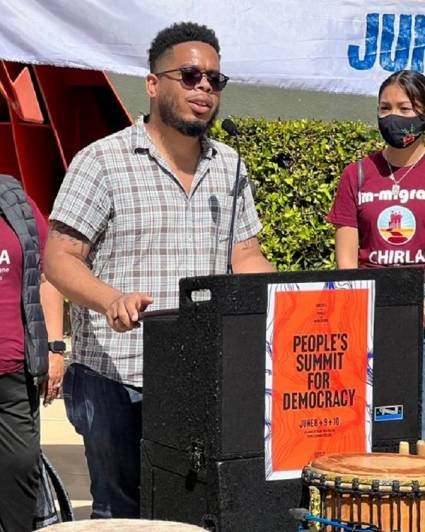
Manolo de los Santos has said that the Biden Summit is already a failure. Autor: @manolo_realengo/ Twitter Publicado: 04/06/2022 | 09:56 pm
Despite the fact that they have been denied permission to march on June 10 through the streets of the city of Los Angeles, the People’s Summit 2022, which, as every year since 2005, is held parallel to the misnamed Summit of the Americas, will demonstrate on that day.
The confirmation was given by Manolo de los Santos, coordinator of the event, when asked by Juventud Rebelde. But the question was just the newspaper’s excuse to extend in a dialogue via whatsApp, to ask the also co-director of the People’s Forum organization and a member of the International Assembly of the Peoples, his vision about that refusal. The importance of an appointment that is held, he said, “at a key moment”, as well as the reasons on which the decision to hold the march is based despite everything, among other issues related to the exclusionary Summit of the Americas that, in his criteria and that of many, is already a failure.
“We decided -and we have already told the Police Department and we have asked them to communicate it to the federal government- that we, with or without permission, are going to march in the city of Los Angeles; not only because it is our democratic right, but also because it has been many years of struggle, and what we come to express are not only complaints but demands, demands that our peoples of the entire continent have against this exclusionary Summit,” he said in reference to the presidential meeting.
De los Santos spelled out the details of the refusal that comes after a semester of preparation for the Peoples’ Summit and “exactly three months” after the organizers requested permission to mobilize in the city.
“We asked the Los Angeles Police Department for it and we were confident that the democratic and legal process here in the United States was going to guarantee our right to free expression.
“We had been waiting for months for a response, until last week, finally, they informed us that the federal government and the Secret Service had not yet authorized that march and that, therefore, they could not give us the permit.”
“We have denounced it,” said the social activist, who considered that “this Summit of the Americas, which already has a character that excludes progressive countries like Cuba, Venezuela, Nicaragua, is also excluding the peoples, and the same people who reside in this city, who are living a very strong economic and social crisis.
“On top of that, to say that this Summit of the Americas, which is not democratic for all the countries of the Americas, is also not democratic for the peoples who want to express and make their voices and their points of view visible, is too much,” he asserted.
Asked about the central motivations of this meeting of the peoples, De los Santos said that much has changed in our continent since the initial Peoples’ Summit of 2005, in Mar del Plata.
“On the one hand, we lived through a period of great growth of popular forces, of leftist forces; many popular governments came to power. But we have also seen a great period of counterrevolution, we have seen a period of coups, military interventions, of trials against progressive presidents.
“In other words, the U.S. Government has not ceased to lash out against leftist and popular processes in our continent, and I believe that when we arrive at this Peoples’ Summit in 2022, we do so at a time when the U.S. Government has not ceased to maintain that policy of aggression against Latin America and the Caribbean.
“On the contrary, it has deepened it, and it has done so despite the fact that President Joe Biden, in his campaign, had spoken of turning a new page in the history of relations between the region and the United States.”
Rejection of exclusion
The young social activist of Dominican origin also denounced the Biden administration’s attempt to divide Latin Americans; “to decide which Latin Americans are the “good” and which are the “bad” ones, “based on which political, social and economic systems we have decided to carry out.”
“That is why this Summit comes at a key moment. It is a real battle of ideas that is taking place in Los Angeles. And I think there is already a recognition, even within American society itself, that Biden and his Summit have been a failure, before they even started. Because the consensus that they assumed they had in Latin America in their favor does not exist,” he said.
The social activist also valued as very important “the massive rejection, not only of other presidents and heads of state, I believe that of the society and the peoples of Latin America and the Caribbean”, to the exclusion of Cuba, Venezuela and Nicaragua from the Summit of the Americas.
“I believe that this has also been dismantling the idea that the United States had consensus in the region and that it could continue to impose its decisions.”
“We have even seen the fragmentation of certain U.S. alliances in the region. Therefore, I believe that this Summit of the Americas will mark a before and after in the relations between the United States and Latin America.
“They will have to realize now that they can no longer maintain the same relationships. That our peoples have the impetus to be free, to be sovereign, to be independent above all else, and that our own integration fronts will have to emerge and be strengthened. And that we, the people in the United States, who identify very much with these causes, want to be part of this integration process”.
Manolo de los Santos affirmed that, for this reason, “the People’s Summit will be a reflection of all the struggles that are taking place in our continent; of the voices of Cuba, Venezuela, Nicaragua, which they have wanted so much to exclude, but which will be present, anyway, in Los Angeles.
“Our banners of struggle, the battle for sovereignty, for independence; the struggle for agrarian reform, for quality education for all; the struggle for a health system, to eliminate the “apartheid” of vaccines (anti-COVID-19), all of that will be present at the People’s Summit, and not only by the panelists from all over the continent who will be sharing with us but also in the struggles and political mobilization that will take place.”
Regarding Washington’s refusal to grant visas to the members of the Cuban delegation that would attend the Peoples’ Summit, De los Santos confessed that “to be honest, we were very upset with the denial of visas, precisely when we know that the U.S. government is inviting reactionary figures.
“They denied the possibility of a dialogue with the American people; they were afraid of the presence of the delegation of dignified Cubans who, beyond politics, beyond ideology, were going to talk about concrete and material achievements of their peoples, they were going to talk about everything possible that the Cuban Revolution is doing in these times, not only to improve the quality of life of its own people, but to help the rest of humanity.
“We were left without that live presence, but, in any case, Cuba will be present at the Peoples’ Summit; it will be participating through digital means, and I believe that no matter how much they want to block relations between peoples, we insist that Cuba is not our enemy, Cuba is a friend of humanity, and we have the right to accompany it and walk together with it in this great struggle for humanity.”
A Summit by and for the peoples
MORE than 200 organizations, trade unions and social movements have confirmed their attendance to the meeting, to be held in the U.S. city of Los Angeles under the banner of A Summit by and for the peoples, on June 8, 9 and 10, “to counteract the 9th Summit of the Americas (…)”, announces the call to protest.
Domestic terrorism in the terrorist state

Domestic terrorism in the terrorist state
The search for notoriety, the need to be heeded, social inequalities, anger, desperation, racial hatred, coexist in a country that dominates the world through the greatest expression of violence, war. All this and more underlies those who pull the trigger in the streets, schools and workplaces of the United States.
Published: Sunday 29 May 2022 | 12:05:15 am.
Author:

Juana Carrasco Martin | juana@juventudrebelde.cu
Translated and edited by Walter Lippmann for CubaNews.
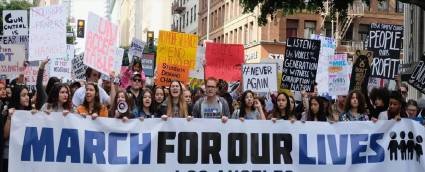 Tuesday’s devastating mass shooting in Uvalde – a small Texas town where the victims were 19 students between the ages of seven and 10 and two teachers at Robb Elementary School, where the majority of the student body is Latino and poor like the perpetrator himself – put the spotlight on this weekend’s National Rifle Association (NRA) annual meeting in Houston, Texas.
Tuesday’s devastating mass shooting in Uvalde – a small Texas town where the victims were 19 students between the ages of seven and 10 and two teachers at Robb Elementary School, where the majority of the student body is Latino and poor like the perpetrator himself – put the spotlight on this weekend’s National Rifle Association (NRA) annual meeting in Houston, Texas.
The pro-gun lobbying group’s convention was being held starting Friday some 300 miles from the scene of the tragedy, and that day would feature appearances by Texas Governor Greg Abbott, Texas Senator Ted Cruz and former President Donald Trump, all Republicans.
The NRA has successfully “lobbied” Republican members of Congress – to many of whom it contributes juicy donations during their election campaigns, as it does to more than a few Democrats – to reject any bill that would restrict access to guns, including a ban on assault weapons and high-capacity magazines, and also to reject a bill that would apply background checks to all gun sales.
Texas is an excellent supporter of the Second Amendment to the U.S. Constitution, and last year passed a law allowing people to carry handguns without a permit or training in their use.
On Thursday – as the family of Irma Garcia, one of the two teachers killed in Uvalde, announced that the teacher’s husband of 25 years and father of her four children, had died of a heart attack as a result of the tragedy – Senate Republicans blocked the Domestic Terrorism Prevention Act.
The legislation would have created an interagency task force within the Department of Justice, the Department of Homeland Security and the FBI to analyze and combat the infiltration of white supremacists into the military and federal law enforcement agencies.
It was an attempt to respond to an earlier shooting, just ten days before the one in Texas, at a supermarket in Buffalo, New York, that left ten people dead, most of them Black, and was perpetrated by a young white, racist, right-wing extremist, tragic event that was described by President Joe Biden as an act of terrorism that should no longer be allowed.
Senate Democratic Majority Leader, New York lawmaker Charles Schumer, said before the vote, “The bill is so important because the mass shooting in Buffalo was an act of domestic terrorism. We have to call it what it is, domestic terrorism. It was terrorism that fed on the poison of conspiracy theories like the white replacement theory,” and he saw it as an opportunity to curb gun violence, but his call for Republican support to begin debate failed.
A clear political dividing line put those of the political parties above the interest of safeguarding a society. Not a single Republican said yes to the measure, arguing that it would open a door to inappropriate oversight of political groups and create a double standard for groups on the extreme right and left of the political spectrum.
Some of those men, supposedly public servants, called it an “insult” to police officers, and labeled it a plan by Democrats to “name our police as white supremacists and neo-Nazis.”
It is obvious to recall the degree of impunity that police brutality has generally enjoyed, one of the most serious, enduring and controversial human rights violations in the United States as confirmed by human rights organizations, a national and institutionalized problem, expressed in unjustified shootings, severe beatings, lethal chokeholds during arrests, and other unnecessarily harsh physical treatment, where the victims are generally Blacks and Latinos.

The shortest night in the world

The shortest night in the world
Amid gunfire, bombs and with cities surrounded by the Rebel Army, the last day of 1958 in Cuba had an unexpected end for many people.
Author:

Luis Raúl Vázquez Muñoz |digital@juventudrebelde.cu
Published: Thursday 30 December 2021 | 08:34:42 pm. Updated: Friday 31 December 2021 | 12:09:53 pm.
Translated and edited by Walter Lippmann for CubaNews.
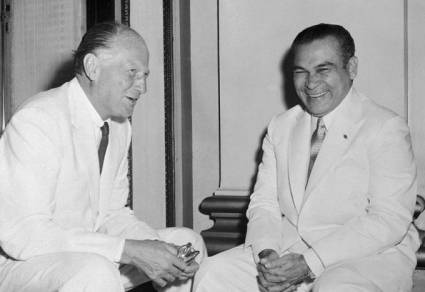
Ambassador Earl T. Smith with Batista. Smiles over, a warning: he could not enter the United States. Author: JR Archive Posted: 12/30/2021 | 07:39 pm
That night of December 31, 1958, journalist Alejandro Vilela slept little. At the edge of dawn, in the middle of the deepest sleep, he was awakened by a phone call. It was his boss, Jorge Bourbakis, the director of Radio Reloj: “Vilela, how are you?”.
The reporter had to take a deeper breath to get rid of the heaviness of rest. Despite the customs of the date, Vilela went to bed early, after playing a game of dominoes at a friend’s house.
It was the end of the year, he had to stay up late until the next morning, but every now and then in the neighborhoods of Havana he heard gunshots or the explosion of a bomb. It was not a festive atmosphere, so he decided to return home. However, all the lethargy disappeared instantly when he heard: “You need to come here”.
The telephones in the CMQ building, where the radio station is located to this day, were tapped by the police. Therefore, those very precise words at that hour of the morning, without providing further details, were a sign that something very big was going on. The definitive certainty, however, came when he pushed open the door of the radio station and found the newsroom turned into a maelstrom.
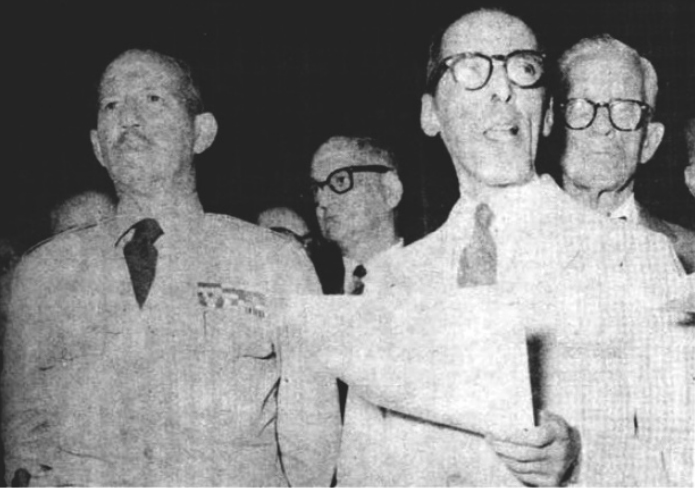
Magistrate Carlos Manuel Piedra tried to form a government with Cantillo as head of the army. The attempt only lasted a few hours. Photo: Bohemia Archive.
“Vilela,” said Bourbakis, “it seems that Batista is leaving Cuba at this moment. You need to confirm it”. As he attended the police news, Vilela had deciphered the codes of the patrol cars, so he had identified the code number of the vehicles of the main bosses, and with a little attention he could find out what was going on in any place.
He sat down at the receiver and immediately discovered something strange. At that hour the cars of the top brass were reporting from the airstrip of Aerovias Q, a private airline with frequent flights to the United States, located in the area of the Columbia military camp. The voices were nervous, and when a subordinate asked for instructions, his bosses ordered him to interrupt the communication and call immediately by telephone.
Suddenly, an operator made a brief allusion to car one. Vilela frowned: “Car one? Why at that hour was the car at the airport without the trip having been announced?
After 3:00 a.m. the plant fell silent. Only an occasional transmission could be heard, and that silence was great compared to the agitation heard minutes before. Still, one question lingered in the air: if all the bosses went to the airport, why didn’t they report back, as usual?
Vilela turned away from the receiver and as he turned around he saw that everyone in the newsroom was in front of him. Nothing could be heard. With shrugged shoulders, he announced, “Bourbakis, I believe that, indeed, Batista has just left Cuba.”
***
A few hours before, after dinner time, Sergeant Jorge Tasis, from the Investigations Bureau, was driving through the streets of Havana in his Ford Falcon. It was cold and, except for the occasional gunshots heard in the distance, nothing seemed to disturb the officer’s journey.
Suddenly, a sharp order was heard over the radio: “All Bureau cars, report urgently to the post”. Such a call was unusual, and Tasis pushed the car’s accelerator pedal to the metal. In eight minutes he arrived at the headquarters building, at the intersection of 23rd Street and the Almendares River bridge.
The place was a whirlwind, and everywhere there were cars with open doors and armed officers, as if they were going to war, but dressed in civilian clothes. The head of the Information Bureau, Colonel Orlando Piedra Negueruela, appeared with his escort, and at a signal, a caravan of vehicles sped toward the Air Force building at the Columbia military camp.
Piedra got out of the car and walked away from the group. After ten minutes he returned in a stifled state and said, “Only those I mention on this list are coming in with me. The rest of you, go back to your services.” On the list were the main officers who had been singled out for their crimes and were considered the most wanted by the Cuban underground.
Before they went to the airfield, Piedra ordered: “Leave your weapons here”. Tasis was not mentioned, but a colonel named Medina ordered him to enter. On the way to the runway, Tasis heard the sound of two C-54s with their four engines running. They were lit from the inside and with the passenger stairs attached to the doors. Nearby were three other planes with their turbines running. Five minutes later, three cars arrived at full speed and Batista got out of a dark-colored Cadillac. Without stopping, and almost oblivious to the commanding voices of presenting arms, he boarded the first plane, located about 500 meters from the Air Force building. With him were his eldest son, Jorge; his brother-in-law, General Fernandez Miranda, four escorts and an entourage of 36 people.
Already on the last steps, he turned to General Eulogio Cantillo Porras, chief of operations in the East, and said: “Cantillo, call Magistrate Piedra immediately. Call a conference of the press bloc. Communicate with the American Embassy… Do not fail to follow my instructions!”.
Possibly, Tasis could not contain a tingling in his body. Through the second C-54, the head of the army, General Francisco Tabernilla Dolz, entered with his family and about 40 people. At the foot of the stairs everything was agitation and it is possible that the sergeant -like many that night, although in other places in Havana- could not contain some words that tightened in his mind: “But what the hell is happening here?”.
***
Perhaps it all began on December 9, 1958, when Batista received William D. Pawley, former manager of Panamerican Airways in Cuba, at his Kuquine estate. Pawley was his friend and a man who spent part of his childhood on the island.
During the conversation, as if out of the corner of his eye, while they were talking about the situation in the country, the American, also considered a person close to President Eisenhower, suggested to the dictator that he resign and leave with his family for his residence in the United States, in Daytona Beach.
“No one will bother you there,” he insisted. Batista refused. He said that, on his honor, he would remain in power until February 24, 1959, when he would hand over command to President Andres Rivero Aguero, who was elected in a rigged ballot with little participation.
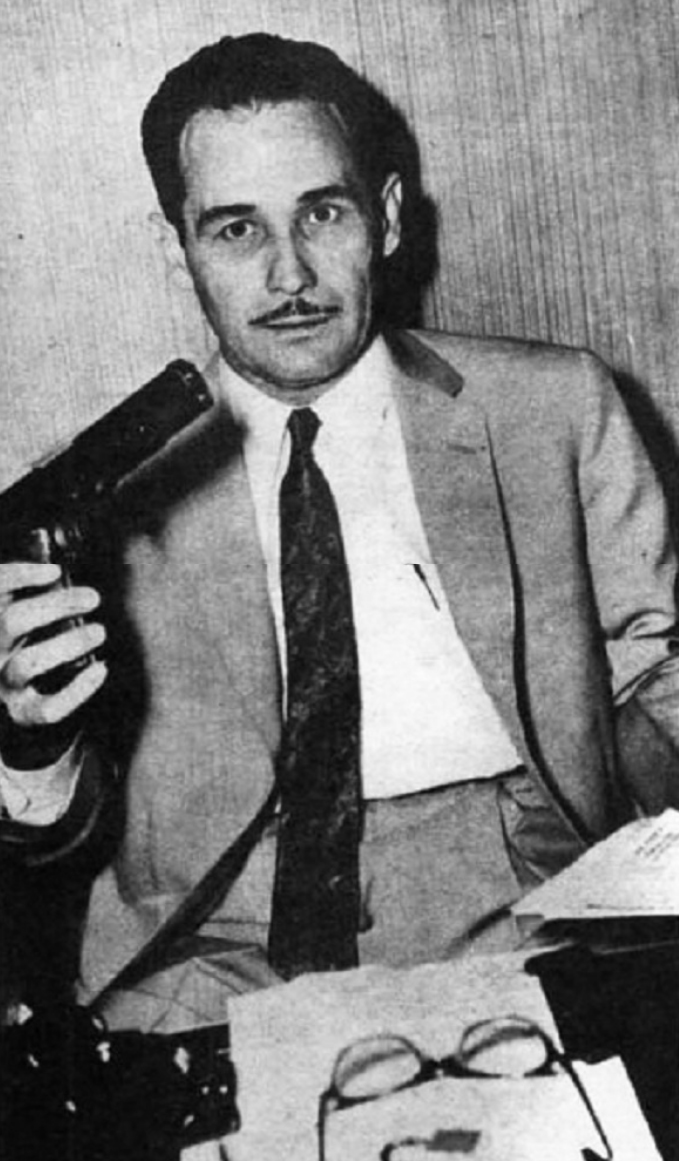
Lieutenant Colonel Esteban Ventura Novo entered the plane where the dictator was fleeing at gunpoint. Photo:JR Archive.
Despite the cordiality, Batista must have felt that that exchange was neither so personal nor so private. And he was not wrong: upon his return, Pawley prepared a note for the State Department in which he referred to everything he had discussed at Kuquine. The tycoon’s report coincided with the report of others, who, under hidden instructions from Washington and with the indication that everything should be seen as a concern of friends, recommended to the dictator the possibility of resigning, but was met at all times with a flat refusal.
The day after Pawley’s visit, the U.S. Ambassador to Cuba, Earl T. Smith, traveled for a meeting with the State Department’s top executives for Latin America. The concern was not only about the present but also about the future.
The intelligence analyses were not favorable, and by the 16th a secret report would circulate in which it was predicted that by December 23rd the Oriente province would be isolated from the country, and its capital, Santiago de Cuba, would be surrounded by the Rebel Army.
The Military Junta or a provisional government was the most favorable option; but Batista had to give up power and he did not want to do so. On the 14th, already in Cuba, Earl T. Smith received a telegram with a clear instruction: he was to inform the dictator that he no longer had the support of the United States.
The message was given in the office of the Kuquine estate, where a solid gold telephone stood out, a gift from the president of Compañía Cubana, a subsidiary of the American giant ITT. With Dr. Gonzalo Güell as a witness, in his dual capacity as Prime Minister and Minister of Foreign Affairs, Smith conveyed his government’s position. However, the clearest and most terrible point for Batista appeared at the end, when the diplomat warned that his family could, but that he specifically could not enter the United States. “Maybe in six or seven months we could give him the visa,” he said. Maybe…
***
The big game began seven days later. On the afternoon of December 22, 1958, the head of the guard, Colonel Airman Cosme Varas, entered Batista’s private office on the third floor of the Presidential Palace.
“Colonel, locate General Silito for me”, the dictator ordered. That order, which would later be known by Corporal Silverio Hertman, one of the communications operators in the Palace and a collaborator of the 26th of July Movement, was carried out within minutes.
“General Tabernilla is at the Armored Regiment Headquarters and is waiting for the micro, president,” Cosme Varas reported. “Tell him to see me without fail at the residence at ten o’clock,” Batista ordered.
At 10:00 p.m., with Germanic accuracy, Brigadier General Francisco (Silito) Tabernilla Palmero, Batista’s military aide and chief of armored vehicles, entered the mansion of the Columbia military camp. There he received a list. Having listened to the instructions, he quickly went to his office to lock himself in with his assistant, Captain Martinez, who was a typist. The list was retyped to remove names and include others.
Having finished the work in the middle of the night, and agitated by what was coming, he went to the house of his father, General Francisco (Pancho) Tabernilla Dolz, head of the army. As soon as he entered, without much ceremony, he announced, “He is leaving.”
***
The plan of the escape would be two-sided. On the one hand, a firm resolution would be shown. On the other, under the curtain, a coup would be organized in which Cantillo would take command of the army and negotiate with the Rebel Army to gain time and form a government presided over by Dr. Carlos Manuel Piedra, the oldest magistrate of the Supreme Court.
Colonel Ramón Barquín Pérez, who was in prison in Isla de Pinos for having led an attempted rebellion in 1956 under a movement known as Los Puros, would be released at 2:30 a.m., after the dictator’s escape was confirmed. Barquín’s mission would be to take control of the army and the government and stop the Revolution. As part of the plan, on December 28 Cantillo would meet with Fidel in Oriente, with the purpose of organizing an uprising. Batista, of course, would be kept informed of everything.
***
On Wednesday, December 31, 1958, at the stroke of midnight, Batista appeared smiling in the living room of the presidential residence in Columbia. A servant uncorked a bottle of champagne and the dictator raised his glass. “Happy New Year, gentlemen,” he said. “Cheers! Cheers!”
A few minutes later, still in the midst of the greetings, Prime Minister Gonzalo Güell announced, “Mr. President, the Dominicans are waiting.” It was the signal. Batista excused himself and said he would return immediately. Soon after, an assistant colonel approached the president of the Senate, Anselmo Alliegro Milá: “Doctor, the president asks you to come down”. Alliegro thought it was for a few drinks and asked Rivero Agüero to go with him. The military man was polite, but firm: “You alone, doctor”.
When he passed through the anteroom of the office he was dumbfounded: the head of the Military Service, General Perez Coujil, bathed in sweat, had one foot on a suitcase and with the help of several officers, he was trying to close it. The other astonishment was when he entered the office: Batista, surrounded by high-ranking officers and with a violet face, was signing a document.
“Alliegro, these gentlemen have given me a coup d’état!”. The President of the Senate smiled: “Mr. President, you mean a military coup”… “Alliegro, call it whatever you want; but it is a coup and I resign”.
The politician began to breathe in an agitated manner, while General José Eleuterio Pedraza approached him with a mocking gleam in his eye. In one hand he carried a piece of paper and in the other a pen. In his ear, he whispered, “Sign quickly, before the troops find out that this man is leaving.”
A telephone rang. Batista picked it up and immediately hung up. “Good evening, gentlemen,” he said. On his way out he took Andrés Rivero Agüero by the arm. “Let’s go!” he said rudely. The president-elect asked agitated, “Where to?”. “Don’t ask! Abroad! Come with me or they’ll kill you too! Tell your wife!” And he shouted: “Martha, pick up the girl!”.
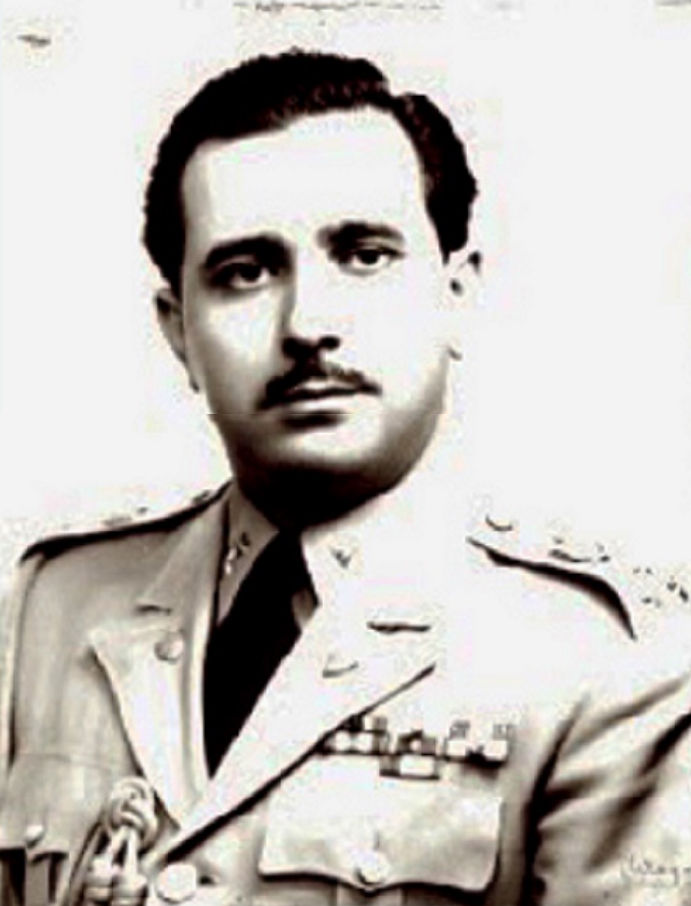
General Francisco Tabernilla Palmero prepared the list of the escape of December 31, 1958. Photo: JR Archive.
About to take off, a fight was heard at the door of the plane. Captain Alfredo J. Sadulé, the military aide in charge of controlling the entrance, was struggling with Lieutenant Colonel Esteban Ventura Novo, chief of the Fifth Police Station and one of the biggest murderers in the country. Ventura had been left off the list and was trying to enter at gunpoint. “Nobody keeps me from getting on board!” he shouted. Batista let him in.
At that moment, while the plane was on its way to the Dominican Republic, in Yaguajay, Captain Alfredo Abon Lee was enduring a strong siege led by Commander Camilo Cienfuegos. In Santa Clara, the forces of the Leoncio Vidal regiment began to be surrounded by the guerrillas led by Ché in the middle of a city full of gunpowder smell and overshadowed by the black smoke of the bombings. In the Oriente, Fidel surrounded Santiago de Cuba and the city was kept on tenterhooks waiting for the combats. In Guantánamo, Raúl was finalizing the details for the final assault on the city.
In the dungeons of the dictatorship, the fresh blood and screams of the tortured could be felt, even with the New Year’s Eve festivities, and on the Columbia airstrip, as far as the eye could see, a forest of suitcases and abandoned cars could be seen in the coldest and shortest night in the world. The war in Cuba was over. It was January 1, 1959.
Sources consulted:
Álvaro Prendes Quintana: Prologue for a battle.Editorial Letras Cubanas, Havana, 1988.
Mario Kuchilán Sol: Fabulario. Huracán Publishing House, Havana, 1972.
Bohemia, special edition of Libertad, January 1959.
Norberto Fuentes: El compañero Silito, in Libreta de Apuntes, blog by Norberto Fuentes, January 20, 2015.
Alejandro Vilela: Batista’s escape from Cuba: Radio Reloj was the first to confirm the tyrant’s flight. In Cubadebate, Wednesday, August 5, 2009.
Documents on the fall of the Batista government, November-December 1958. U.S. Department of State, Bureau of History. Https://history.state.gov/
Texts by Ciro Bianchi published in Juventud Rebelde
No better option than to become a communist

There is no better option than to become a communist
We have many immediate ideas to make the organization a more dynamic and fresh space, representative of all, effectively, says the first secretary of the Communist Youth, Aylín Álvarez García. That is why she asks her contemporaries to accompany these proposals and contribute others in this honest, broad, inclusive discussion, which can never be renounced.
Author:

Yuniel Labacena Romero |Yuniel@juventudrebelde.cu
Published: Saturday 11 December 2021 | 11:04:55 pm.
Translated and edited by Walter Lippmann for CubaNews.
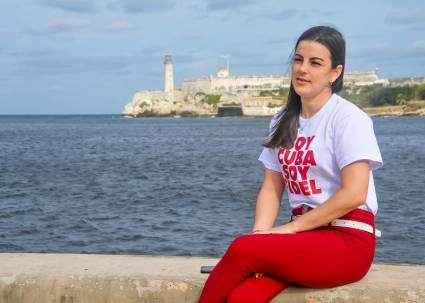
Aylín Álvarez García. Autor: Abel Rojas Barallobre Publicado: 11/12/2021 | 10:06 pm
The young woman who is now having a relaxed conversation combines her motherhood with her responsibilities in the vanguard organization of the Cuban youth. That is why she assures us, without hesitation, that in her two sons, Diego Alejandro and Alvaro Daniel, aged 6 and 11, respectively, she finds the greatest inspiration in her life and the sensitivity required to assume the leadership of the Union of Young Communists (UJC).
“They are the greatest engine of my life; in them, my dreams and aspirations are realized, I find that impulse to continue doing, in them I see that Cuba that I want to build, to improve, to help be part of it. I also want my children to be part of it; in them, I see the clearest expression of the greatness of the Revolution”, says Aylín Álvarez García, first secretary of the National Committee of the youth organization.
Thus, by looking into her family, where almost all the keys to who we are are, we begin our dialogue with a young woman whose personal history reveals examples of constant self-improvement, unimaginable sacrifices and the support of loved ones; a young woman with the typical pace of someone who is used to working hard.
Desmond Tutu Dies at age 90

Desmond Tutu, South African archbishop and Nobel Peace Prize laureate, dies at the age of 90
For his fight against the brutal racist oppression of apartheid, Tutu is considered one of the key figures in South Africa’s contemporary history
Author:

Juventud Rebelde |digital@juventudrebelde.cu
Translated and edited by Walter Lippmann for CubaNews.
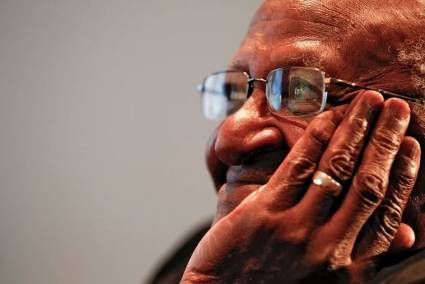
South African Archbishop Emeritus Desmond Tutu. Autor: EFE Publicado: 26/12/2021 | 09:36 am
This Sunday, at the age of 90, died South African Archbishop Emeritus Desmond Tutu, 1984 Nobel Peace Prize winner for his activism against the Apartheid racist segregation regime, in Cape Town, said in a statement issued by the South African government, the country’s president, Cyril Ramaphosa, who sent his condolences to the Tutu family.
“The death of Archbishop Emeritus Desmond Tutu is another chapter of loss in our nation’s farewell to a generation of outstanding South Africans who bequeathed us a liberated South Africa,” the president said in the text.
The president described Tutu as a “peerless patriot” and a “man of extraordinary intellect” who maintained his integrity in the fight against the “forces of apartheid.”
Even in a democracy, Ramaphosa stressed, Tutu maintained the “vigor” and “vigilance” of leadership to hold institutions accountable.
“On behalf of the Anglican Church of Southern Africa, the entire faith community and, dare I say, on behalf of millions (of people) across South Africa, Africa and the world, I send our deepest condolences to his wife, Nomalizo Leah, his son, Trevor Tamsanqa, and his daughters, Thandeka, Nontombi and Mpho,” Makgoba said in a statement.
The voice of the voiceless
“Apartheid, separate development or whatever it is called, is evil (…) It is anti-Christian and unbiblical. If anyone proves me otherwise, I will burn my bible and cease to be a Christian,” Tutu protested to apartheid officials in 1982.
For his tireless struggle, Tutu received the Nobel Peace Prize in 1984, two years before he became the first black head of the Anglican Archbishopric of Cape Town (southwest).
For his struggle against the brutal racist oppression of apartheid, Tutu is considered one of the key figures in contemporary South African history.
:quality(85)/cloudfront-us-east-1.images.arcpublishing.com/infobae/4QNT2SIPIYYZYBCKC7XHJHQDJ4.jpg)
At the World Conference Against Racism (WCAR), September 5, 2001. Photo: Reuters
He was at the helm until 1996, when apartheid was dismantled and South Africa became a democracy led by Mandela.
As president, Madiba – Mandela’s local nickname, who described the archbishop as “the voice of the voiceless” – gave Tutu the difficult task of chairing the Truth and Reconciliation Commission, a body charged with bringing to light the atrocities committed during apartheid.
:quality(85)/cloudfront-us-east-1.images.arcpublishing.com/infobae/QOTNWOB6UVDA5G73FFEL5VNE7Q.jpg)
Desmond Tutu with Mandela. Photo taken from the Internet
Tutu and Mandela, in fact, had resided on the same street in Soweto, which is today one of Johannesburg’s major tourist attractions, to the pride of South Africans, who boast that no other country has a street with two Nobel Peace Laureates.
His career has been marked by a constant defense of human rights, something that led him to dissociate himself on numerous occasions from the church hierarchy to openly defend positions such as gay rights or euthanasia.
In recent years he had stayed away from public life due to his advanced age and the health problems he had been suffering from for years, including prostate cancer.
His last public appearance had been in a few brief video images broadcast on his 90th birthday (last October 7), an anniversary that his foundation celebrated with a virtual conference in which participated, among others, the highest Tibetan spiritual leader, the Dalai Lama, the Mozambican activist and widow of Nelson Mandela Graça Machel or the former Irish president Mary Robinson.
(With information from EFE)
MININT news release on rescue operation

News release from the Ministry of the Interior
Surface units of the Border Guard Troops provided assistance to the castaways of a semi-sunken speedboat
Author:

Web Editor | digital@juventudrebelde.cu
Published: Saturday 11 December 2021 | 06:16:01 pm.
Translated and edited by Walter Lippmann for CubaNews.
At 21:30 hours on December 10, 2021, the Coast Guard Troops Maritime Search and Rescue Coordination Center received a distress call from a vessel in distress in the vicinity of the town of Santa Cruz del Norte, Mayabeque province.
Surface units of the Coast Guard Troops with the participation of a private boat, provided assistance to the castaways of a semi-sunken speedboat, with registration FL 7176SU of the United States, overloaded with people, in adverse hydrometeorological conditions with sea force three.
As a result of these actions, 2 minors, 7 women and 14 men were rescued, including two deceased.
Today, December 11, the search for possible missing persons continues, with the participation of naval units and other forces of the Ministry of the Interior, in the vicinity of the coast.
Once again, Cuban citizens are victims of the policy of the United States Government, which stimulates irregular emigration, which is taken advantage of by human traffickers, who, for profit, put the lives and deaths of human beings at risk.
Ministry of the Interior
Subscribe to Blog via Email
| M | T | W | T | F | S | S |
|---|---|---|---|---|---|---|
| 1 | 2 | 3 | 4 | 5 | 6 | |
| 7 | 8 | 9 | 10 | 11 | 12 | 13 |
| 14 | 15 | 16 | 17 | 18 | 19 | 20 |
| 21 | 22 | 23 | 24 | 25 | 26 | 27 |
| 28 | 29 | 30 | 31 | |||


You must be logged in to post a comment.